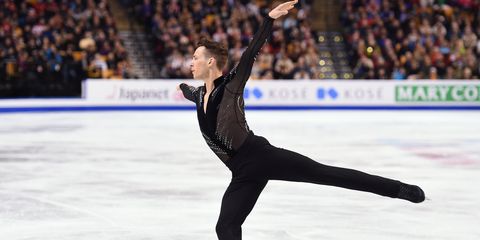Before Adam Rippon won a bronze medal for the U.S. earlier this week in the team figure skating competition, he made headlines for being the first openly gay athlete to qualify for a U.S. Winter Olympic team.
Now he is opening up about his body image issues for the same reason he decided to publicly reveal he was gay in 2015—to help others who are experiencing the same thing.
Back in 2016, just before he won the U.S. figure skating championships, Rippon’s daily diet consisted of three slices of whole-grain bread with I Can’t Believe It’s Not Butter. The only other thing on his menu was coffee—three cups, with six packs of Splenda each.
“It makes me dizzy now to think about it,” Rippon told The New York Times.
At 150 pounds, Rippon now weighs 10 pounds more than he did in 2016—and has received plenty of attention on social media for his butt muscles in particular, which he recently had to convince Twitter are real.
But back then, he wanted to resemble the younger skaters on his team. “I looked around and saw my competitors…they’re a head shorter than me, they’re 10 years younger than me and they’re the size of one of my legs,” Rippon told The New York Times.
According to the Times, Rippon was only 10 years old when a former coach told his mother, Kelly Rippon, that he wouldn’t be able to do more advanced skating jumps because of his “heavy bottom,” and tried to get him to take up speed skating instead. After noticing he was eating mostly water-based vegetables as a teenager, his mom convinced him to eat more protein. While he ate normally for several years, his 2012 move to California to train with Rafael Arutyunyan changed that; Rippon’s new coach encouraged him to adopt the three piece of bread a day diet.
Rippon isn’t the only male figure skater to have experienced these pressures to lose weight. Brian Boitano, the 1988 Olympic champion, told The New York Times that judges would tell him to lose weight, even when his body fat was as low as four percent. Boitano said that when he was competing, he rarely ate more than 1,800 calories per day even though he was burning more than that in training.
Boitano said that his fellow skaters all lived with “an interesting relationship to food,” even after their competitive careers had ended. Body-image issues have also been acknowledged in women’s figure skating; both Yulia Lipnitskaya of Russia and Gracie Gold of the U.S. both withdrew from the sport recently because of eating disorders. But male skaters are more likely to remain quiet about their body image problems.
After breaking his foot during a warm-up in 2017, Rippon finally decided to start working with Susie Parker-Simmons, a sports dietitian from the U.S. Olympic Committee. Parker-Simmons has helped the Olympic athlete address his issues so that he can see food as fuel instead of his enemy.


